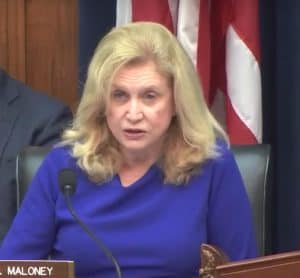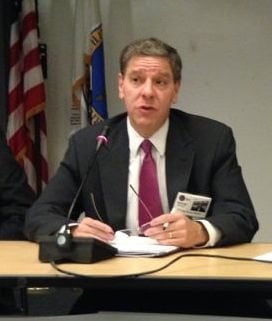Tomorrow (September 11), the House Financial Services Subcommittee on Investor Protection, Entrepreneurship, and Capital Markets, will hold a must-see hearing on “Examining Private Market Exemptions as a Barrier to IPOs and Retail Investment.” The Subcommittee is Chaired by Representative Carolyn Maloney.
 The Hearing incorporates multiple pending legislation that may impact access to capital and retail access to investment opportunity.
The Hearing incorporates multiple pending legislation that may impact access to capital and retail access to investment opportunity.
The Securities Act allows for several exemptions from registration of securities. The Subcommittee hearing memo notes that:
“a security offered or sold in reliance on an exemption is known as an “exempt offering” and the markets for these exempt offerings are known as “private markets.” Because exempt offerings are not required to be registered, investors receive significantly less information about the security than investors in registered offerings. Generally, exempt offerings are limited to sophisticated investors who are judged not to need the protections of the securities laws. Public companies can issue both registered offerings and certain exempt offerings, while private companies may only issue exempt offerings.”
Private markets are now far larger than public markets. The Subcommittee points to the fact that in 2018, $2.9 trillion was raised in the private markets while $1.4 trillion through public offerings. While private markets have become more robust than public ones, retail investors have been cut out of the opportunity equation.
Today, much of the wealth generated in early stage firms is earned before a company decides to go public. For a company, the math simply makes sense. Becoming a “reporting company” is a costly process that is a gift that keeps giving in annual cost due to mandatory filing requirements. While everyone recognizes the importance of disclosure, in recent years the amount of information demanded has turned into a regulatory deluge thus stifling public market growth.
The JOBS Act of 2012, the law that created three different iterations of investment crowdfunding, addressed this issue in part.
Currently, the Securities and Exchange Commission is reviewing the exemption system in a “concept release” that seeks to tackle the topic of regulatory harmonization. The initiative, launched by SEC Chair Jay Clayton, is in recognition of the growing complexity of the securities market and the need to review existing law and perhaps prune and “harmonize” the many exemptions into just a few.
 For the Hearing tomorrow, the Subcommittee has selected the following witnesses:
For the Hearing tomorrow, the Subcommittee has selected the following witnesses:
- Renee Jones, Associate Dean for Academic Affairs and Professor of Law, Boston College Law School
- Elisabeth de Fontenay, Professor of Law, Duke University School of Law
- Mike Pieciak, President, North American Securities Administrators Association, and Vermont Commissioner of Financial Regulation, Vermont Department of Financial Regulation
- Dr. Andrew Lo, Professor, Massachusetts Institute of Technology Sloan School of Management
- Douglas Ellenoff, Partner, Ellenoff Grossman & Schole LLP
Of note, is the addition of Doug Ellenoff, a well-known champion for access to capital for smaller firms and a crowdfunding advocate.
Alongside the Hearing, multiple acts of legislation are being reviewed. Some of these will be of interest to the crowdfunding market. They are itemized below.
The Hearing will be live-streamed on the House Financial Services Committee website beginning at 10AM September 11th.
Legislative Proposals
H.R. ____: Private Securities Transparency and Reform Act: This discussion draft would require issuers offering securities under Rule 506(b) or 506(c) to file a Form D with the SEC before either (1) the first sale of securities, or (2) the commencement of general solicitation. Further, the bill would require issuers to file a closing amendment within 90 days after the offering is completed with certain information, including the total size of the offering, the number of investors participating, and fee amounts. The bill states that failure to file Form D or the closing amendment will result in the loss of the exemption. In addition, the SEC would be required to study brokers who primarily deal in exempt offerings, as well as, the relationship between private, quasi-private, and public securities offerings.
H.R. ____: To require the Securities and Exchange Commission to submit a report to Congress about private securities offerings: This discussion draft would require the SEC to conduct an impact study before proposing or adopting any change to a rule regarding either exempt offerings or reporting requirements for public companies. Based on the study, the SEC must submit a report to Congress identifying, among other things, the impact of the proposed change on investors, the expected size of exempt offerings in light of the proposed change, and the impact that the proposed change will have on the public markets.
H.R. ____: Fair Investment Opportunities for Professional Experts Act (Hill): This bill would expand the definition of “accredited investor,” a designation that permits a person to invest in exempt offerings, to include registered brokers and investment advisers, as well as those who have the appropriate education or experience, as determined by the SEC and verified by the Financial Industry Regulatory Authority (FINRA). In addition, the bill codifies the existing annual income and net worth thresholds and requires them to be adjusted every 5 years for inflation. This bill is similar to H.R. 1585 from the 115th Congress, which passed the House by voice vote.
H.R. ____: Crowdfunding Amendments Act: This bill would amend the SEC’s Regulation Crowdfunding to: (1) allow investors to pool their money into a “crowdfunding vehicle,” and (2) raise the public reporting threshold to a level consistent with other exempt offerings. Investors in these funds would also benefit from the advice of a registered crowdfunding vehicle adviser, who would have a fiduciary duty to the fund, and companies would benefit from only having to work with one fund, instead of thousands of small, individual investors. This bill is similar to H.R. 4855 from the 114th Congress, which passed the House by a vote of 394-4.
H.R. 2899: Main Street Growth Act (Emmer/Gonzalez): This bill would allow the SEC to approve a “venture exchange,” a new category of securities exchange that would only trade small public company securities, provided the securities are subject to state oversight and additional ongoing disclosures. The bill also would require the venture exchanges to submit their rule changes to the SEC for approval and provide the SEC with additional discretion to limit over-the-counter trading off a venture exchange. This bill is identical to H.R. 5877 from the 115th Congress, which passed the House by voice vote.
H.R. ____: Rare Disease Fund Act (Vargas): This bill authorizes the SEC to establish an investment fund to invest in early-stage rare disease therapeutics. The Fund would eventually be privately owned and operated, and investments would be funded by equity and bond issuances, with one class of debt guaranteed by the Federal government. The bill would also establish a leverage limit, and includes diversification requirements to minimize the fund’s risks.
H.R. ____: Family Office Technical Correction Act (Maloney): This bill would deem any person who is a family office or a family client to be an accredited investor. Family offices are generally organizations that manage the financial interests of wealthy families. Under current law, if a single client of a family office is not an accredited investor individually, then the entire family office might not be considered an accredited investor, and therefore would be prohibited from investing in private securities. This bill is identical to H.R. 3972 from the 115th Congress, which passed the House by voice vote.
H.R. 609: Small Business Mergers, Acquisitions, Sales, and Brokerage Simplification Act (Huizenga): This bill would codify an SEC no-action letter29 by exempting certain merger and acquisition brokers from registration as broker-dealers. Under the bill, M&A brokers are defined as brokers that facilitate the transfer of ownership of privately held companies with earnings of less than $25 million or revenues of less than $250 million annually (these levels are adjusted for inflation every 5 years). This bill is identical to H.R. 477 from the 115th Congress, which passed the House by a vote of 426-0.

